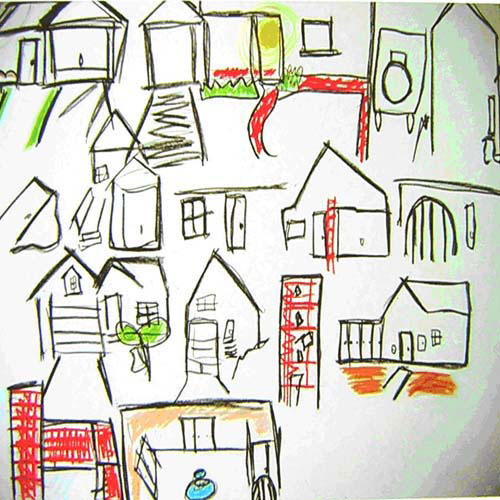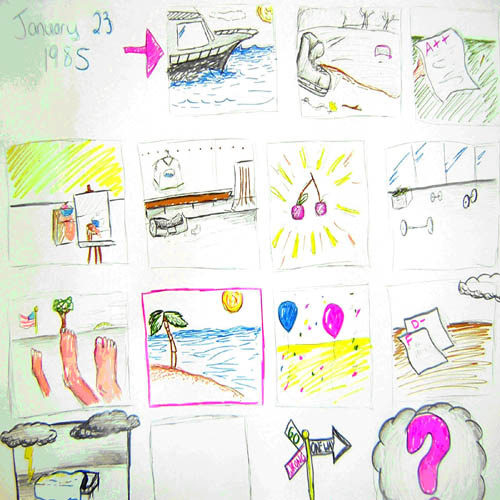This class helps students look at major turning points in their lives using drawing and written forms of self-expression.
Brief Check-in
How students are doing with their on-going photo and writing, collecting found materials, etc. (this is materials used for final projects on "self-portrayal") - 5 minutes.
Discussion of Readings
10 minutes
Exercise One
Drawing My Life - 1 hour
Purpose
To draw your autobiography through visual means.
Overview
This exercise is useful both as an icebreaker and as a way to get you thinking about where you come from and what is important to you.
Materials Needed
Poster board, crayons, magic markers, paint, and other artistic supplies that could be included (feathers, felt, etc.).
Instructions
- You will be given a large sheet of paper and access to a variety of artistic media such as crayons, magic markers, and paint. You have half an hour to draw your autobiography in any way that you wish. The only restriction is that you are limited to the size of the paper, and that you should focus on turning points in your life. This exercise is about exploring your life through visual means, not about being an artist. Anything that participants do is fine for this kind of exercise.
- After half an hour, papers are collected and taped up around the room. You will be asked to explain your visual autobiographies briefly to the group and to answer questions others may have about your drawing. At the end, instructors will ask participants if they see any major similarities or differences in the drawings and if so, what this might indicate about the people in the group.
Examples of Student Exercises

The image above depicts all the homes where the "autobiographer" lived from the time he was born to now. What is most striking when you look at this image? Based on the information in the image, what do you think this person feels? Values? Is there anything that you would like to see in order to better understand this story?

The visual autobiography above takes a very different approach to the previous one, much more narrative in style, like a story board leading from one event to the next. What do you think this says about how this person thinks of their history? What do you think is of value to this person?
Discussion
Following the exercise, we ran a discussion based on the following questions:
- Have there been any specific events in your life that have changed the way you view things? Did you view these events as negative or positive at the time they happened?
- What do you have as tangible proof of the major turning points and influences of your life? What kind of images and writings do you have that denote these events?
- When you think about major influences in your life, you may think of personal items that carry significance not obvious to the outside observer, but that act as triggers for your memory or are emblematic of the time, place, or people who have influenced you. Can you make a mental list of some of these things? Is there any commonality between these items? If you group these items together, what kind of a picture do they create about your life?
Student Commentary on Exercise One
"I found it interesting to attempt to put "my life" on paper, to think of it as something to be drawn with crayons on paper. I was interested in what came out, and with how the rest of the class chose to put their lives on paper."
"Most of the drawings included question marks for the future. I thought that was interesting because I'm used to the idea that the future is a mystery and wouldn't think to express that."
"I thought it was interesting how one person said that my empty box on my poster might be a good thing. When I heard myself actually saying how bad it was for me, it was strange."
Exercise Two
Turning Points in My Life - 40 minutes
Purpose
To help you think about significant events in your life that have shaped your character or destiny.
Overview
It is important to take time to consider past events in our lives that have had a major impact on us so that we better understand who we are today. Sometimes we aren't very conscious of those times and when we stop to really examine them, we are surprised by how much impact they have had, especially the painful ones.
Materials
Paper, pen
Instructions
- Take a few minutes to think about a major turning point in your life, an event that happened to you or someone else, or perhaps to the world outside of yourself, that you think has had an impact on how you turned out.
- Take 15 minutes to elaborate on this event, what happened, and how it impacted you. In what way are you a different person because of what happened? What were the positive and negative aspects of this event? What is the most important thing you learned about yourself as a result of this event?
- In pairs, share your turning points and explanations - examine similarities and differences.
- In a large group, discuss the common themes of people's turning points. In what ways have people's turning points changed them?
Examples
"When I was a sophomore in high school, I applied for a program called Governor's School in my state. The program was to learn about education and practice teaching students of all ages, but major component was also to design a plan to make changes in our communities. I decided to design a plan to encourage cultural mixing in my school district weeks planning a multicultural fair that could take place in the fall of the following year: though implementation was optional I decided to implant the project and it changed my life. The diversity fair, as I called it was the first step I took toward a project which seemed impossible which I was learning from all sides - and I made it happen. It gave me a lot of confidence in my leadership abilities, brought me a lot closer to administrators at my school, and whetted my appetite for leadership. Since the, I have always been on the lookout for unconventional leadership opportunities and I have loved being a part of them. Without Governor's School, I'm not sure I would have found this passion so early in life. Even then, I knew it would affect my life extremely and positively."
"Last year my parents told me that, when my grandpa died, my grandma went crazy. Really crazy…not just pushing a shopping cart aimlessly down aisle 2…but unable to function. A woman who had before been as able as he should be for her generation, self sufficient - suddenly turned into a body going through the motions, Barely going through the motions,, of life. So they tried to help but couldn't. So they put her in a hospital. Asylum? Maybe. Rehab clinic? Maybe. But somehow she was supposed to get better, and I was not to know.
Until last year. And when they told me, I was sad. Not in a pathetic, tearful, gasping for air way - but in longing way. Because it hit me how impermanent life is, but also the meaning of lie. If my parents had died before telling me, I never would have known. That story that chapter of my grandmother's life and therefore of my parents and mine, would have gone unlearned. And I know that in the scheme of things, it doesn't matter if my grandma was a nut case for a few years. It does not help discover The Grand Unified Theory - it does not make my dad's days at the office any shorter. But it means something me because of what it represents of how much we lose every day and don't' eve realize it. And part of me thinks this is beautiful, because it means only the most meaningful things remain when all else is lost and we all go through it in our own way. But part of me finds this tragic because we seem to lose more than we are given. And I think of how many people, in my life, alone, have died, and how their stories - from the most banal to the most treasured are gone. I will never know what my grandpa thought the first time he saw my grandma…or his own son, or me. It just hurts because I want to know so very badly - to know where I come from, to know what it was like to live when he was alive. So I can understand why my grandma basically shut down when he died - she didn't just lose her husband, she lost everything he knew, and loved - the way he felt about her, the sound of his voice. There are videotapes and letters, sure, but they can never fill the desire to know and be known. And sitting in the back of my parents 2004 Subaru, soft grey cushioned seats, I thought this as they explained to me why I should call my grandma back in a timely manner when she calls me…and why she wants us to call her when we get home from visiting her to make sure we got home okay. I got home in one piece that night and called her…but was I okay?"
Discussion
Following the exercise, run a discussion based on the following questions:
- What makes turning points so powerful?
- What can you gain from a turning point?
- Have you experienced a change in the way you view turning points over time (i.e. did you experience a turning point as negative at first, then realized it had a positive outcome over the longer period).
- Do you think there are any turning points that have no positive aspects?
Student Commentary on Exercise Two
"I enjoyed discussing my turning point with another person. I think it helped me realize how similar people can be. I found the connections between the positive and negative interesting as well."
"Having 30 minutes to reflect on what is important to me - something I seldom allow myself the luxury of doing."
"I liked how it was personal without really "exposing" anyone. Using themes to describe our turning points instead of just narrating the stories was really nice."
"I liked the reflection on our turning points...it gave me the opportunity to really think about life-changing events."
